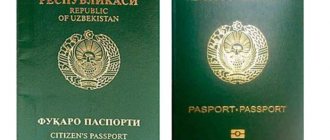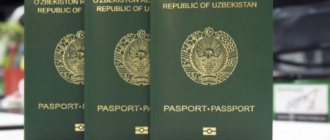International marriages are not uncommon in Russia. Often girls marry citizens of CIS countries who come to the Russian Federation to work.
Accordingly, the following question arises: how to register a marriage with a citizen of Uzbekistan in Russia according to the law, and whether difficulties and obstacles may arise.
Marriage with a foreigner on the territory of the Russian Federation is carried out in accordance with local laws and rules. True, a foreign groom will have to collect a little more documents than a Russian citizen.
List of documents in the registry office
All marriages on the territory of the Russian Federation are concluded in the registry office.
When submitting an application, future newlyweds will need to collect the following package of documents:
- Both parties provide: an identity card, a document on divorce (if one of the future spouses had one previously), a certificate of reaching marriageable age (when registering with a minor).
- A citizen of Uzbekistan is required to provide a certificate confirming that there are no obstacles to marriage. A foreigner receives such a document on the territory of his country.
- An application to the registry office, drawn up according to Form - 9. It can be filled out either at the registry office at the place of marriage, or by downloading the form on the official website.
- If a citizen of Uzbekistan is in his homeland, he can send written confirmation of his desire to get married. With this document, the bride goes to the registry office to submit an application.
- Passport confirming the legality of stay on the territory of the Russian Federation. The document must be translated into Russian and certified by the consulate.
Since Uzbekistan is a country that was formerly part of the USSR, legalization of documents for its citizens is not required.
How to register a marriage with a citizen of Uzbekistan in Russia
Hello. I am a citizen of the Russian Federation, I want to register my marriage with a citizen of Uzbekistan, what certificates and documents are needed from his side, if he is registered in Uzbekistan, he needs to go to Uzbekistan to get certificates or you can get them by making a request, we live in St. Petersburg
From Uzbekistan, he needs a certificate from the registry office that his marriage is not registered on the territory of Uzbekistan and its translation into Russian. You can get it directly at the place of registration in Uzbekistan or at the consulate, which is located in Moscow, or you can contact him at the St. Petersburg Society of Compatriots of Uzbekistan “Umid”, Contact numbers Tel. (812) 322-40-81 Address - 199106, St. Petersburg, V.O., Bolshoy pr., 83, House of National Cultures.
We recommend reading: Can a working veteran of labor return interest on wages?
Conditions and circumstances that prevent marriage
Before you go to the registry office to submit an application, it is worth checking whether there are any circumstances that could become an obstacle to an official union:
- Russian law prohibits polygamy. If one of the future spouses is already married in their homeland, the Russian Federation will refuse to register a legal marriage.
- One of the obstacles to marriage is close family ties. It is, of course, difficult to imagine such an outcome of events, but in life anything can happen.
- According to the law, marriage between an adoptive parent and an adopted child is impossible.
- An obstacle to marriage with a citizen of Uzbekistan may be a mental disorder of one of the spouses. However, in this case, incapacity must be officially confirmed by the court.
Stories about how an already married Uzbek decided to acquire a second wife in Russia are far from uncommon. Therefore, it is worth first checking whether the groom is planning to create a harem.
How to register a marriage with a citizen of Uzbekistan in Russia in 2020
Today, it is becoming increasingly popular to have two citizenships. However, in Uzbekistan, as in Russia, this is prohibited by law. However, in practice, this happens if the second citizenship was obtained in a country where being a binational is allowed. In this case, the person independently decides which documents to submit to the registry office. Until a citizen renounces Uzbek citizenship, his passport is considered a legal proof of his identity.
In the modern world, marriages in which one of the spouses is a foreigner are becoming increasingly common. Representatives of Uzbekistan actively choose Russian beauties as wives. In this regard, a very pressing question is how to register a marriage with a citizen of Uzbekistan in Russia. In order not to encounter difficulties, it is better to find out in advance all the nuances associated with entering into a marriage relationship with a foreigner.
We recommend reading: How long after the registration of the house can you return 13%
Official registration and ceremony
The official procedure for registering a marriage with a citizen of Uzbekistan is no different from a wedding with a Russian.
The ceremony takes place in the registry office at the place of registration of a citizen of the Russian Federation, which is usually held thirty days after submitting the application.
On the wedding day, the couple enters the wedding hall to the sound of Mendelssohn's march. According to tradition, the presence of two witnesses is required. On the bride's side it should be the girl, and the man on the groom's side.
The registrar reads out a solemn speech, then asks the newlyweds whether the desire to create a social unit is sincere and mutual. After this, the rings are exchanged. The spouses sign two copies of the civil status act. After which they are issued a marriage certificate.
Dear readers! To solve your problem right now, get a free consultation
— contact the on-duty lawyer in the online chat on the right or call:
+7
— Moscow and region.
+7
— St. Petersburg and region.
8
- Other regions of the Russian Federation
You will not need to waste your time and nerves
- an experienced lawyer will take care of solving all your problems!
If a citizen of Uzbekistan marries a Russian
You can. If you decide to register a marriage in Russia, you need to find out which registry office in your place of residence registers marriages with foreigners. To enter into a marriage, you will need the following documents: When registering a marriage on the territory of the Russian Federation, the procedure for its conclusion is determined by Russian legislation, the procedure will not differ in any way from registering a marriage between the Russian Federation.
Simplified acquisition of Russian citizenship for a citizen of Uzbekistan if there are relatives of Russian citizens. I am a citizen of Uzbekistan, Ivanov, my wife is Russian, my son is Russian. Father is Russian. Do I have the right to obtain Russian citizenship in a simplified form?
07 Jun 2021 etolaw 404
Share this post
Related Posts
What difficulties may arise
The main problem that may arise after the wedding is another family at home.
And it doesn’t matter that the husband does not have a stamp in his passport, and the state issued a certificate of no obstacles to marriage.
It is often the case that in Muslim countries of the former USSR, couples do not officially marry, but only enter into a union in the mosque, called “nikoh”.
Therefore, the man calmly marries again, and his wife finds out about the second family only after the fact.
Uzbek men are very sensitive to their family, including their parents. Sooner or later, the husband may want to return to Uzbekistan. The reasons may be different - from the need to help an elderly father and mother, to the desire to spend the rest of their lives in their native lands. Here the Russian girl will have to choose: either follow her beloved, or dissolve the family union.
Traditions dictate that a wife should be completely submissive to her husband . Therefore, the Russian bride may have to adapt to her soulmate. It is important to show due respect to the entire Uzbek family, not only to parents, but also to sisters-in-law and brothers-in-law.
The unpleasant thing is that the husband’s relatives can smile sweetly in his face, but say unpleasant things behind his back.
And most importantly, in any conflict, an Uzbek man will always remain on the side of his parents.
This possibility should not be ruled out - the husband may prohibit his wife from working so that she can look after the household and raise the children.
Another prohibition that an Uzbek man can impose on a woman is to wear revealing clothes and short skirts.
Modern society, although it calls itself European, does not always have a liberal attitude towards international unions. Especially when it comes to citizens of neighboring countries. So you should be prepared for criticism and misunderstanding from even your closest friends and relatives.
“Mom cried, dad called me a litter.” Married to a migrant
According to official data, in 2021 there were 4.2 million labor migrants from the CIS countries in Russia. Some of them enter into fictitious marriages with Russians in order to quickly obtain a temporary residence permit, but not all of them enter into marriages of convenience.
“His dad said that I am better than a hundred Tajiks”
Anastasia, 30 years old, St. Petersburg:
I met my future husband in 2010. I worked in a store, and Farrukh often came there, although I didn’t remember it. We had a machine to top up our mobile phone account. Once I deposited money, but didn’t take the check - and my future husband took advantage of this. He collected the check and called me shortly after. At that time I was in a relationship and did not communicate with him. Soon I broke up with my boyfriend. While flipping through my address book, I came across an unfamiliar number and decided to check who it was. So we started calling each other and then decided to meet. When I saw him, I fell in love at first sight. When I was 15 years old, I had a dream: I opened the door to a man with black hair. I didn’t see his face then, but the sensations that arose when I looked at Farrukh coincided with those in the dream. He became family and friends from the first day we met.
Farrukh worked as a driver at a factory. We dated for a week, he drove me home and didn’t hint at anything - and then I invited him to live together. At first he tried to change me. I resisted. I have many friends, including men. They simply could not find out in a week that I was in a relationship, and they called me. Farrukh did not like this. A month later everything got better. Farrukh explained that I was no longer alone and should report my movements (I live in the suburbs and work in the city) so that he would know where I was. My previous boyfriend was henpecked, so at first it was unusual for me. Six months later we decided to get married, and after some more time I became pregnant. Farrukh was happy, and so was I. Some say that migrants marry Russian women for registration, but Farrukh already had a temporary residence permit at the time we met.
My relatives received my husband well. They saw our eyes, full of happiness and love. But his dad was so against our marriage that he even came to us from Tajikistan. He believed that Russian women, for the most part, are leisurely and uneconomical, but after living with us for a month, he said that I was better than a hundred Tajik women. I was raised by my grandmother, so I grew up modest and economical - try not to wash the baseboard with your grandmother! As a result, his dad blessed us: “You are a good girl, family-oriented, you respect me and your son.”
Farrukh's dad said that according to Islam you can marry a Christian, but she needs to believe in God
I have not accepted Islam, but I respect my husband’s traditions, and he respects mine. And his dad said that according to Islam you can marry a Christian, but she needs to believe in God. I, like half of Russians, believe in God when it’s bad, I don’t consider myself an atheist. At Easter we go to my grandmother’s cemetery, and Farrukh always says: “Thank you for my granddaughter and my wife.” For his holidays I cook Tajik dishes.
I didn’t go to Tajikistan - it’s very expensive. I sent my son. We often call Farrukh’s relatives and communicate in Russian and Tajik. I learned his language myself, without being forced.
I have never faced condemnation, maybe because people think that I am Tajik. My appearance comes from my grandfather, he is Georgian. We are happily married and others can see it. Farrukh never said a bad word to me or raised a hand against me. He doesn't drink or smoke. She truly loves me - I have never felt this before. Seven years of marriage flew by like a year. The husband solves all problems. I feel like a woman next to him, confident in the future. A year ago I gave birth to my second child, but I’m not going to stay at home. I immediately warned Farrukh: if you want a stay-at-home wife, go to your homeland and get married there. So there is no problem with this. While I'm on maternity leave, my husband works as a production manager at
Anna, 31 years old, Moscow:
My husband is Moldovan. I met him three years ago in a nightclub. Sasha, a handsome tall brunette, danced better than anyone and did not look the way, in my opinion, a migrant worker should look - good clothes, perfume. I didn't even hear the accent right away. I was hooked by his appearance: he could work as a model. Such a handsome and smart guy certainly doesn’t belong on a dirty construction site. Many girls at the club liked Sasha, but he invited me to dance, then walked me home and wrote to me the next day.
We started living together almost immediately, Sasha was very persistent. I didn’t dare introduce him to my relatives. He introduced me to my mother and other relatives who were in Moscow. For some reason they doubted my attitude towards him: supposedly a Muscovite could not be interested in a simple Moldovan guy.
A month later I introduced Sasha to my parents. Before that, I had a very long and painful relationship in which I was betrayed, so my parents were wary of a stateless Moldovan who was three and a half years younger than me. At first I told my mother that I liked the boy, but he was not Russian, she widened her eyes: “Who?” I said I was Moldovan. “Thank God, not a Chechen!” Mom thinks that all Chechens are dangerous. Then moral teachings began that Moldovans are Muslims (although they are Orthodox), bigamists, they have seven children in their homeland, and he only needs me for citizenship (although marriage is not enough to obtain citizenship). The pope said that all Moldovans are gypsies. This is another big stupid thing that pisses me off. I specifically studied history: the gypsies come from India, and the Moldovans are descendants of the Romans. The gypsies have their own two cities. I only saw gypsy beggar children. You can immediately understand that these are not Moldovans: they have a different skin color. In addition, to my surprise, there are many natural blondes in Moldova. And also a very beautiful language, similar to Italian, and beautiful dances and music.
I've been to Moldova twice. We were greeted as the most dear guests. The Moldavian table is a separate issue: they prepare it as if it were for a wedding; although the country is poor, I have never seen such treats anywhere. Wine, especially from the south, is something incredible. It was especially awkward when we went to visit my relatives, and we weren’t even offered tea: not because of a prejudiced attitude towards Sasha, but because everyone had forgotten what hospitality is. In the summer they send me delicious fruits from Moldova, watermelons, huge raspberries, and cheeses for my husband.
I told my mother that I liked the boy, but he was not Russian, she widened her eyes: “Who?” I said I was Moldovan. “Thank God, not a Chechen!”
Sasha proposed to me on March 8, kneeling in front of my parents, his mother and sister. It was so romantic, especially against the backdrop of our Moscow cattle, and touched my parents. He and his relatives paid for the entire wedding. I only bought myself a dress. In Moldova, people spend three days at a wedding, but in Moscow it’s until 11 p.m., the deadlines are tight, you can’t make noise. My relatives watched the Moldavian dances with curiosity.
Spoiled Moscow boys, my peers, hardly work or do not have permanent jobs, sit on their parents’ necks and wait for the apartment to become available. Migrants have no time, they have to hang around, earn money, rent housing, keep track of documents, not break the law, because even the slightest administrative offense can be deported. I look at my husband with admiration when he fixes or repairs something. He can do absolutely everything. With him I am protected and more confident in the future than with my ex - a Muscovite, a mama's boy.
My parents, seeing Sasha’s attitude towards me and his thriftiness, eventually accepted him, and I’m just glad that I don’t have to explain basic things several times, like my ex. My husband even writes without errors, although Russian is not his native language. My ex-boyfriend and former friends spoke disparagingly about my husband because of his nationality. But at the age of 30 they have achieved nothing, but he has the potential and desire to achieve something. Discussing nationality is primitive, because a person does not decide what he will be born into, and besides the fact that they are Russian, they have nothing else to boast about.
My husband provides for us completely. We also help my retired parents. Until recently, my husband was doing repairs, like most visitors. But people often deceive in this matter. We decided to open an individual entrepreneur and work officially, under a contract. Now Sasha is engaged in diamond cutting of concrete. We took out the equipment on credit, but customers prefer to work without a contract, on parole. The last situation unsettled me: my husband received an urgent order, work on the construction of a temple, I had to go “right now” and without a contract, payment - 20,000 rubles. And what do you think? This money was not paid! My husband spent money on consumables, not to mention hard physical labor, and in the last month of pregnancy I was under a lot of stress. If people are thrown into church, where should we look for justice? Nothing is sacred among people. Government agencies have the same disdainful attitude. Migrants are much more decent and honest than many Russians, and they are considered second-class citizens.
“I always wanted to be better than my first wife”
Angela, 39 years old, Irkutsk:
In 1996, my classmates met Tajik guys and invited me to a party with them. There I met my future husband. He introduced himself as Roman, although his real name was different - it was easier to remember. I liked him immediately. I had just broken up with my boyfriend and decided that we were fighting each other.
Roma sold vegetables and fruits in Angarsk, and that evening he came to visit his brother. Everything somehow started spinning quickly. He moved to my city. We dated all summer. My parents found out about Roma when I was nine weeks pregnant. They insisted on an abortion, I agreed, but on the appointed day there was no water in the hospital, and they told me to come tomorrow. I did not go. There was a huge scandal.
Mom cried and said that Roma would leave me, I would be left alone with the child, and dad called me a litter. But I survived everything. I had a prejudice about Russian guys: it was a time of alcoholism and drug addiction, and I decided that I would not marry a Russian.
Roma and I rented a house and began to live together. They signed only 11 years later - and only because he wanted to get a Russian passport. In March 1997, I gave birth to a son. My parents immediately took me home, and the child’s father was only allowed to come for a visit. In May, my parents went to live in the village, and we began to live in our parents’ apartment.
Roma’s relatives did not know about my existence, since he had a wife in Tajikistan. I knew about her from the very beginning, but I hoped that he would leave her, because he loves me. When I was pregnant, she gave birth to a son. I reacted normally to this: she’s there, and I’m here. In 1999, the husband went home to Tajikistan: he had never seen his son from his first wife, his father died, and he did not send any money to his family. At that time, he could transport no more than a certain amount across the border, but there was more money, so he invited me to go too. I agreed. We were supposed to stay there for 15 days, but in the end I lived in Tajikistan for three years. My parents found out that I left when I was already there.
My son forgot Russian and was already speaking Tajik, ran up to me, hugged me and immediately pushed me away. He said that I left him and that it would be better if I disappeared or died.
We arrived in Leninabad. My husband left me with his friend Said, and he and our son left for Dushanbe, saying that the anniversary of my father’s death would be the other day and I wouldn’t have time for it. I didn’t know then that from Leninabad to Dushanbe it was a day’s drive across two borders, Kazakh and Uzbek. My husband promised that he would return in ten days and send my son and me home. There were no cell phones then, only home phones. We waited for the call, but Roma didn’t call for a long time, and then he said that he had some problems and needed to wait. After three months of waiting, I panicked: I wanted to see my son and return home with him. Finally, Roma called and said that he couldn’t come himself, and I would have to go to Dushanbe alone.
I was shocked when I saw an old and dirty train, in which a bunch of people were sitting with trunks. At the border they took my passport and tickets - allegedly there was something wrong with the documents. I explained that I was going to Dushanbe and they would meet me there, that my husband’s uncle worked at customs (this was true) and that if I didn’t get there, they would be skinned. They didn’t give me my passport, they took my things for inspection in case I was carrying something prohibited. I don’t remember how long I spent in the vestibule - it was an eternity. Then the conductor said that I needed to go to the first carriage. Three accompanying Uzbek police officers were drinking in the compartment. One of them, a senior in position, began to scare me that I had problems with my documents, but if I had sex with him, then everything would be fine. I was hysterical and, of course, was not going to agree. He had to get off the train at the border and told me that I would go with him. In Uzbekistan, he left the compartment and did not enter again. Then the conductor returned my documents and said that I could go to my carriage.
Finally I arrived in Dushanbe. I was greeted well. My son forgot Russian and was already speaking Tajik, ran up to me, hugged me and immediately pushed me away. He said that I left him and that it would be better if I disappeared or died. He was only three years old then. Of course, I was shocked, but it didn’t mean anything anymore, the main thing was that he was nearby.
It was not possible to return to Russia right away: my husband had no money. He settled me in the city, not far from the center, with his mother and two sisters, he lived in a village with his first wife, and came to visit me as his mistress. Roma’s mother was a very good woman, and my sisters also treated me normally, and they loved my son very much. All these three years, life was good: as in ordinary families, we argued, made up, they took me on holidays and took me to concerts. The women taught me how to sew men's trousers and sell them at the market - they themselves did the same. They hardly knew Russian, I had to learn Tajik in order to somehow understand them and those around me. I learned to cook like them, wore clothes like theirs, kept fasts and said prayers five times a day. I converted to Islam while I was pregnant with my son: I wanted my husband to be proud of me and, of course, I always wanted to be better than my first wife.
Living in Tajikistan, I realized how much the locals don’t like the Russian people: women believed that their brothers and husbands were going to Russia to earn money, and we were luring them into the net with our disgusting behavior
Soon Roma's first wife gave birth to a second son. I even met them. My wife, of course, was not very happy with me and told me to go home to Russia.
Living in Tajikistan, I realized how much the locals don’t like the Russian people: women believed that their brothers and husbands were going to Russia to earn money, and we were luring them into the net with our disgusting behavior. But they accepted me as one of their own there. Once in a minibus, an elderly woman, hearing that I spoke Russian, was indignant that I had betrayed my native language, and then did not believe that I was Russian.
In 2003, I became pregnant with my daughter. The husband asked for an abortion, but his sisters and mother were against it. I didn’t want to give birth there and put the question bluntly: either I go home or hang myself. He wanted to leave to earn money, but the threat of suicide had an effect. Roma borrowed money and sent my son and me home. In Russia they looked at me as a migrant, and my son spoke only Tajik. My family was shocked: they thought they would never see me again.
When my daughter was almost a year old, Roma came to visit us for a short time. A year later, he arrived with his wife and her relatives and rented them an apartment nearby. We lived like this for three years. Then I grew up and realized that I didn’t want to do that anymore. I was already 30. Then my husband got a job in Moscow - my first wife’s brothers lived there, who already had Russian citizenship and their own business - and he left. We often called each other, I started talking about how I wanted to organize my life, especially since my first wife gave birth to three more. He just laughed and said: “Who needs you!” And I met another man and got divorced. The husband then threatened to take the children away. Now they are adults: the son is 20 years old, he is a true Muslim, although he grew up virtually without a father, the daughter is 14, and is receiving a passport. So now their father will not take them away without their consent. Now I am sure that relationships need to be built in your own country, with your own people, and marriage with a migrant is too big a risk.
They seat women at a separate table
[region:bone:inline_1]
In the Uzbek family, a strict hierarchy of relationships has been built: children are kept in strictness, the woman is largely subordinate to her husband and mother-in-law, the last word always remains with the man. The wife is respected as a mother, spouse, and guardian of the family hearth, but is often considered only as a housewife, despite the fact that free women of the East are engaged in science and politics, sit in the Senate and manage enterprises. A woman's main responsibility is to take care of her family and home. Even if she works equally with her husband, this does not cancel the preparation of dinner for his arrival.
To this day, many things in everyday life are divided according to gender: morning pilaf is prepared by men, everyday food is prepared by women, men gather in a teahouse, women - in the yard. Previously, the house was divided into male and female halves, but now at weddings and other holidays, men and women often sit at different tables. They even bury them in different parts of the cemetery.
They pay the bride price
Before the wedding, families agree on what contribution the newlyweds will make to their future family life. For example, if the groom buys an apartment, the bride buys all the furnishings. The size of the dowry and bride price are also specified - in many areas they still pay a bride price. The amount of dowry varies from $30 to $5000 in different regions.
It is most profitable to get married in Khorezm: here the groom pays most of the wedding expenses, he also pays a large bride price, and if the man is from a rich family, they can add, for example, a camel to the money. Recently, girls with higher education (preferably medical or pedagogical) are especially valued - in this case, the amount of dowry can increase several times. But in Tashkent, expenses fall on the shoulders of the bride’s parents - they must give her a substantial dowry in order to successfully marry her off.











